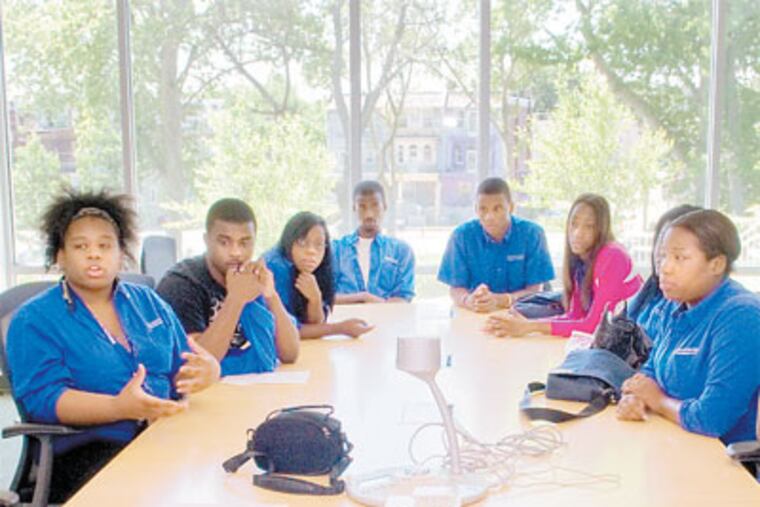School of Future: High on tech, low on basics?
One hundred and six members of the High School of the Future's first senior class will graduate at the school in Fairmount Park this morning.

One hundred and six members of the High School of the Future's first senior class will graduate at the school in Fairmount Park this morning.
Only 11 members of the 117-member class won't graduate, principal Rosalind Chivis said yesterday.
On what should be one of the most exciting days of a high school student's life, the class will graduate under a microscope, as some parents allege that the school was so focused on technology that many basics went by the wayside.
Controversy over the school came to light three weeks ago, when parent Ivy Dixon told the School Reform Commission that despite its high-tech environment, the School of the Future left her daughter and other seniors less prepared for college than they should have been.
"Students' college options are limited," Dixon said, because students lacked a solid foundation in core subjects.
This was especially true during the school's first two years, Dixon said, when teachers were free to bypass the district's core curriculum and create a curriculum as they went along.
Students were not given traditional grades at first. Rather, there was a "narrative" grading system in which students were marked at either "novice," "basic," "proficient," or "advanced" levels of achievement.
Chivis said that she changed both the grading system and instituted the district's core curriculum after she became the school's fourth principal in two years in September 2008. But Chivis did not implement the core curriculum until February 2009, when this year's senior class was more than halfway through 11th grade.
She said that students couldn't transfer to other high schools or get accepted by colleges without a traditional grade-point-average scoring system.
"We had to get a more accurate method of student assessments," Chivis said.
According to a teacher who asked not to be identified, the problems went deeper than having four principals in rapid succession. The teacher said that there was a split among teachers - largely along generational lines - on how to best implement the school's program.
More-experienced teachers worried that students were missing basic courses, and younger teachers were upset that switching to the core curriculum would restrict innovation, according to a recent article in Education Next, a quarterly journal .
Last week, Chivis gathered about 20 members of the Class of 2010 to respond to accusations that the school had not prepared them for college. Several students said that they had been accepted by more than one college.
"I do totally feel ready," Mahcaiyah Wearing-Gooden said.
She is going to Green Mountain College, in Vermont, in the fall, and was accepted by six colleges.
Johanna Caines, 18, conceded that "some of us feel like we wasted the first two years. But in 11th grade, we had to do so much work."
Caines said that students were told in the beginning that they were part of a laboratory-like experiment.
"They told us in eighth grade that we were going to be guinea pigs," Caines said. "When we first got here, everybody said, 'You are going to be lab rats in the ninth grade.' "
Chivis said that every graduating senior has been accepted by a college or post-high school program, a feat that she is proud of, since the school is a regular neighborhood school, without special admissions criteria.
Chivis said that two students got full scholarships to Villanova and dozens more were accepted by Penn State or state colleges.
Nearly a quarter are going to Community College of Philadelphia.
About 160 students were chosen by lottery to make up the first ninth-grade class when the school opened in the Parkside neighborhood in September 2006, Chivis said.
From the start, the school was in the national spotlight, as a Microsoft-partnered school intended to reshape the existing model and provide urban students with the latest in technology.
Every student was assigned a laptop computer, and school district officials at first touted it as a place where all learning would be online, without textbooks. Chivis said that the school now buys books if teachers request them.